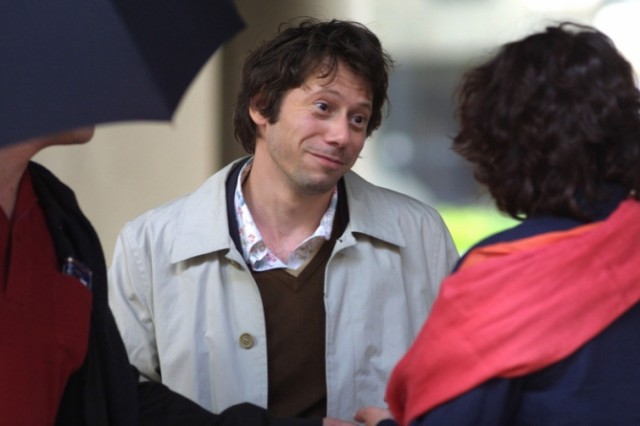
The always-engaging Mathieu Amalric is being feted by Anthology Film Archives and the French Institute Alliance Française
KINGS AND QUEEN (ROIS ET REINE) (Arnaud Desplechin, 2004)
Anthology Film Archives
32 Second Ave. at Second St.
Saturday, October 31, 6:00, and Saturday, November 7, 8:30
Series runs October 29 – November 8 (companion series at FIAF runs November 3 – December 15)
212-505-5181
anthologyfilmarchives.org
 Award-winning French actor-director Mathieu Amalric is celebrating his fiftieth birthday with an exciting invasion of New York City, where he is being honored in a pair of terrific companion film series and will also star in a theatrical production. FIAF’s CinéSalon tribute runs on Tuesday nights through December 15, beginning November 3 with a screening of his 2014 film The Blue Room, followed by a Q&A with Amalric and costar and cowriter Stéphanie Cléau, who is also his real-life partner; Amalric will also star in Fight or Flight (Le Moral des Ménages), Cléau’s stage adaptation of the novel by Eric Reinhardt. But the big festivities begin at Anthology Film Archives, where “Mathieu Amalric: Renaissance Man” runs October 29 through November 8, featuring ten of his films, including Otar Iosseliani’s 1984 Favorites of the Moon, in which he makes his film debut, and 2001’s Eat Your Soup, his first directorial effort.
Award-winning French actor-director Mathieu Amalric is celebrating his fiftieth birthday with an exciting invasion of New York City, where he is being honored in a pair of terrific companion film series and will also star in a theatrical production. FIAF’s CinéSalon tribute runs on Tuesday nights through December 15, beginning November 3 with a screening of his 2014 film The Blue Room, followed by a Q&A with Amalric and costar and cowriter Stéphanie Cléau, who is also his real-life partner; Amalric will also star in Fight or Flight (Le Moral des Ménages), Cléau’s stage adaptation of the novel by Eric Reinhardt. But the big festivities begin at Anthology Film Archives, where “Mathieu Amalric: Renaissance Man” runs October 29 through November 8, featuring ten of his films, including Otar Iosseliani’s 1984 Favorites of the Moon, in which he makes his film debut, and 2001’s Eat Your Soup, his first directorial effort.
Amalric has made several films with Arnaud Desplechin (A Christmas Tale, My Sex Life . . . or How I Got into an Argument), and one of the best is being shown October 31 and November 7 at Anthology. In Kings and Queen, Emmanuelle Devos is spectacular as Nora, a divorced single mother with a ten-year-old son (Valentin Lelong), an ailing father (Maurice Garrel), a troubled sister (Nathalie Boutefeu), a straitlaced, boring fiance (Olivier Rabourdin), a dead ex-husband who appears as a ghost (Joachim Salinger), a manic, tax-evading ex-husband who is institutionalized (a fabulous Amalric), and a deep-seated survival instinct that is infectious. Throw in a suicidal woman (Magalie Woch) who can’t get enough sex, an alluring doctor (Catherine Deneuve), a drug-addicted lawyer (Hippolyte Girardot), a remarkably calm, gun-toting convenience-store owner (Jean-Paul Roussillon), and other unusual characters and plotlines and you have one highly entertaining, complex, and marvelously original French drama that will fly by much faster than its two-and-a-half-hour length would lead you to believe. Amalric won his first César for the role; he won his second three years later for The Diving Bell and the Butterfly. Amalric will be at Anthology to introduce the October 31 screening of Roman Polanski’s Venus in Fur.
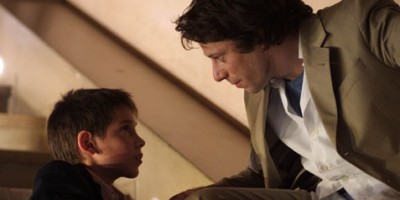
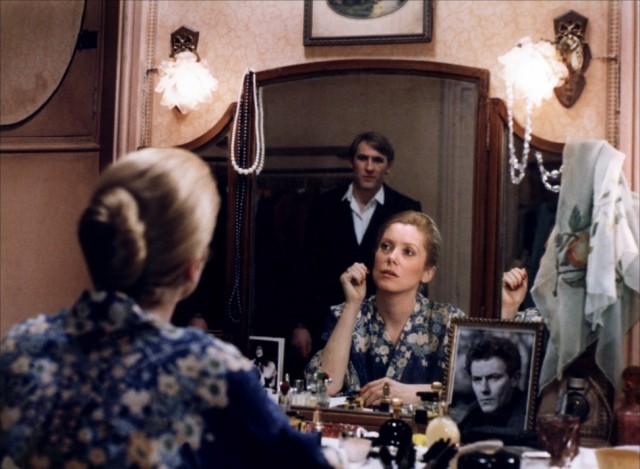
 FIAF’s CinéSalon series “Theater & Cinema” concludes October 27 with François Truffaut’s powerful Oscar-nominated WWII melodrama, The Last Metro. Set in Vichy France during the German occupation, the film takes place in and around the Théâtre Montmartre, which has been taken over by movie-star actress (and non-Jew) Marion Steiner (Catherine Deneuve) after her husband, Jewish theater director Lucas Steiner (Heinz Bennent), has apparently escaped the Nazi regime. But in fact Lucas is hiding out in the theater’s basement, where he has translated a Norwegian play, aptly titled Disappearance, and is directing it from below. The cast and crew of Disappearance include ladies’ man Bernard Granger (Gérard Depardieu) as Marion’s love interest; costume designer Arlette Guillaume (Andréa Ferréol), who refuses Bernard’s advances because of a secret reason; young actress Nadine Marsac (Sabine Haudepin), who will do just about anything to get parts; stage manager Raymond Boursier (Maurice Risch), who is deeply dedicated to the theater; and Jean-Loup Cottins (Jean Poiret), the stand-in director for Lucas. Only Marion knows where Lucas is, but danger grows when critic, publisher, and Nazi collaborator Daxiat (Jean-Louis Richard) starts sniffing around a little too much.
FIAF’s CinéSalon series “Theater & Cinema” concludes October 27 with François Truffaut’s powerful Oscar-nominated WWII melodrama, The Last Metro. Set in Vichy France during the German occupation, the film takes place in and around the Théâtre Montmartre, which has been taken over by movie-star actress (and non-Jew) Marion Steiner (Catherine Deneuve) after her husband, Jewish theater director Lucas Steiner (Heinz Bennent), has apparently escaped the Nazi regime. But in fact Lucas is hiding out in the theater’s basement, where he has translated a Norwegian play, aptly titled Disappearance, and is directing it from below. The cast and crew of Disappearance include ladies’ man Bernard Granger (Gérard Depardieu) as Marion’s love interest; costume designer Arlette Guillaume (Andréa Ferréol), who refuses Bernard’s advances because of a secret reason; young actress Nadine Marsac (Sabine Haudepin), who will do just about anything to get parts; stage manager Raymond Boursier (Maurice Risch), who is deeply dedicated to the theater; and Jean-Loup Cottins (Jean Poiret), the stand-in director for Lucas. Only Marion knows where Lucas is, but danger grows when critic, publisher, and Nazi collaborator Daxiat (Jean-Louis Richard) starts sniffing around a little too much.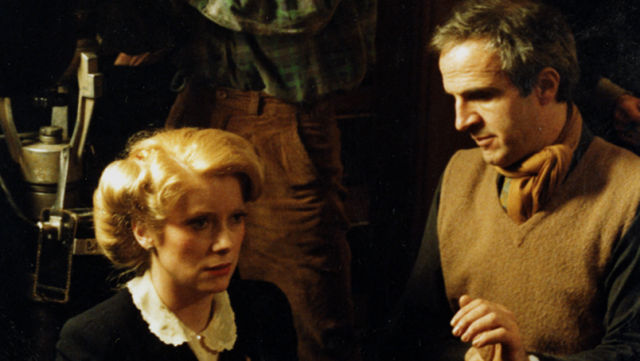

 France’s official selection for the 2007 Academy Awards, Persepolis brings to animated life Marjane Satrapi’s stunning graphic novels. Codirected by Satrapi and comic-book artist Vincent Paronnaud, Persepolis tells Satrapi’s harrowing life story as she comes of age during the Islamic Revolution in Iran in the late 1970s and early 1980s. Raised in a well-off activist family, she fights against many of the country’s crippling mores and laws, particularly those that treat women as second-class citizens, trapping them in their veils, denying them any kind of individual freedom. But the progressive Satrapi (voiced first by Gabrielle Lopes, then Chiara Mastroianni) continually gets into trouble as she speaks her mind, experiments with sex, and refuses to play by her country’s repressive rules. Satrapi and Paronnaud do an outstanding job of adapting the books’ black-and-white panels for the big screen, maintaining her unique style and emotional breadth. The first part of the film is excellent as the precocious teenager who talks to God learns about life in some very harsh ways. Unfortunately, the second half gets bogged down in Satrapi’s failures as an adult, focusing too much on her myriad personal problems and taking away the bigger picture that made the first part so entertaining as well as educational. Still, it’s a story worth telling, and well worth seeing. (Interestingly, since the film, which is in French, is subtitled in English, the audience ends up reading it similarly to the way they read the graphic novel.) The closing-night selection of the 2007 New York Film Festival, Persepolis also features the voices of Catherine Deneuve as Marjane’s mother, Danielle Darrieux as her grandmother, Simon Akbarian as her father, and François Jerosme as her radical uncle Anouche. Persepolis is screening on December 19 at 7:00 as part of the Museum of the Moving Image’s “See It Big! Animation” series, which continues through December 28 with such other recent feature-length animated flicks as Marjane Satrapi and Henry Selick’s Coraline 3-D, Ari Folman’s Waltz with Bashir, Brad Bird’s Ratatouille, and Satoshi Kon’s Paprika.
France’s official selection for the 2007 Academy Awards, Persepolis brings to animated life Marjane Satrapi’s stunning graphic novels. Codirected by Satrapi and comic-book artist Vincent Paronnaud, Persepolis tells Satrapi’s harrowing life story as she comes of age during the Islamic Revolution in Iran in the late 1970s and early 1980s. Raised in a well-off activist family, she fights against many of the country’s crippling mores and laws, particularly those that treat women as second-class citizens, trapping them in their veils, denying them any kind of individual freedom. But the progressive Satrapi (voiced first by Gabrielle Lopes, then Chiara Mastroianni) continually gets into trouble as she speaks her mind, experiments with sex, and refuses to play by her country’s repressive rules. Satrapi and Paronnaud do an outstanding job of adapting the books’ black-and-white panels for the big screen, maintaining her unique style and emotional breadth. The first part of the film is excellent as the precocious teenager who talks to God learns about life in some very harsh ways. Unfortunately, the second half gets bogged down in Satrapi’s failures as an adult, focusing too much on her myriad personal problems and taking away the bigger picture that made the first part so entertaining as well as educational. Still, it’s a story worth telling, and well worth seeing. (Interestingly, since the film, which is in French, is subtitled in English, the audience ends up reading it similarly to the way they read the graphic novel.) The closing-night selection of the 2007 New York Film Festival, Persepolis also features the voices of Catherine Deneuve as Marjane’s mother, Danielle Darrieux as her grandmother, Simon Akbarian as her father, and François Jerosme as her radical uncle Anouche. Persepolis is screening on December 19 at 7:00 as part of the Museum of the Moving Image’s “See It Big! Animation” series, which continues through December 28 with such other recent feature-length animated flicks as Marjane Satrapi and Henry Selick’s Coraline 3-D, Ari Folman’s Waltz with Bashir, Brad Bird’s Ratatouille, and Satoshi Kon’s Paprika.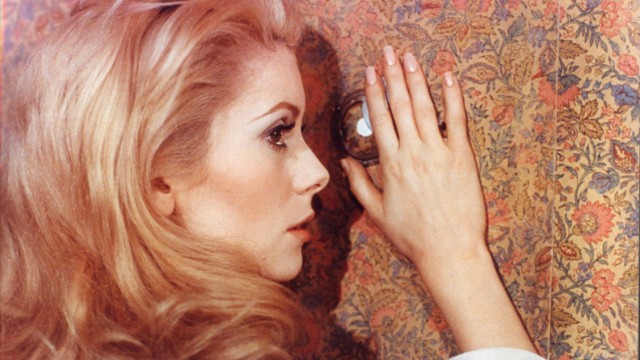
 Luis Buñuel’s alluringly psychosexual masterpiece Belle de Jour caused a sensation when it was released in 1967 because of its heavy dose of sadomasochism mixed with tender love, and with good reason. The film stars the always elegant Catherine Deneuve as Séverine Serizy, a bored housewife who deeply loves her husband, Dr. Pierre Serizy (Jean Sorel), despite their nearly nonexistent sex life; they even sleep in separate beds in the same room. The twenty-three-year-old blonde beauty has intense daydreams of being tortured and raped, the lasting effects of perhaps having been abused as a child, so when she learns of a high-class Paris brothel, she decides to investigate, tantalized by the exciting possibilities. Soon she is known as Belle de jour, “lady of the afternoon,” as men come to lie down with her in the middle of the day, leaving her enough time to get home for her workaholic husband. At first Séverine is terrified of the job, but she is calmed down by Madame Anaïs (Geneviève Page) and eventually finds herself enjoying these secret trysts, so much so that the money doesn’t even matter, only the sensual pleasure she experiences. But when one of her clients, the unpredictable and dangerous thief Marcel (Pierre Clémenti), starts falling for her, her life turns more complicated than she’s ever imagined in all her dark yet playful fantasies.
Luis Buñuel’s alluringly psychosexual masterpiece Belle de Jour caused a sensation when it was released in 1967 because of its heavy dose of sadomasochism mixed with tender love, and with good reason. The film stars the always elegant Catherine Deneuve as Séverine Serizy, a bored housewife who deeply loves her husband, Dr. Pierre Serizy (Jean Sorel), despite their nearly nonexistent sex life; they even sleep in separate beds in the same room. The twenty-three-year-old blonde beauty has intense daydreams of being tortured and raped, the lasting effects of perhaps having been abused as a child, so when she learns of a high-class Paris brothel, she decides to investigate, tantalized by the exciting possibilities. Soon she is known as Belle de jour, “lady of the afternoon,” as men come to lie down with her in the middle of the day, leaving her enough time to get home for her workaholic husband. At first Séverine is terrified of the job, but she is calmed down by Madame Anaïs (Geneviève Page) and eventually finds herself enjoying these secret trysts, so much so that the money doesn’t even matter, only the sensual pleasure she experiences. But when one of her clients, the unpredictable and dangerous thief Marcel (Pierre Clémenti), starts falling for her, her life turns more complicated than she’s ever imagined in all her dark yet playful fantasies.
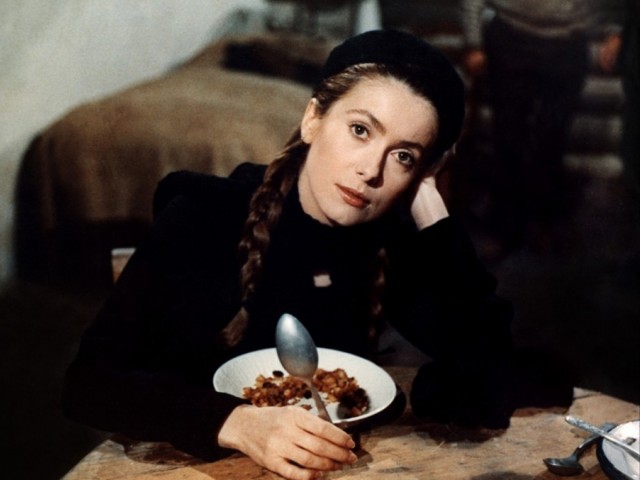
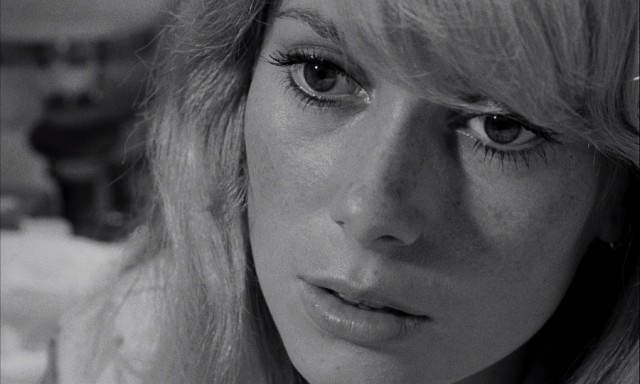
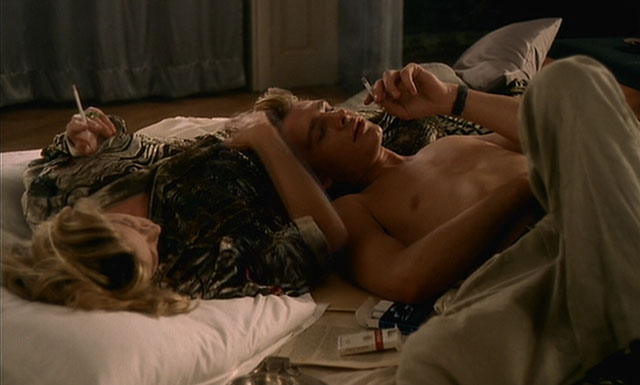
 French auteur Leos Carax’s adaptation of Herman Melville’s controversial 1852 novel, Pierre: or, The Ambiguities, is a dour, plodding tale of family dysfunction reaching ridiculous heights. Named after the first letter of each word in the French title of Melville’s tome, Pierre ou les ambiguities, and the tenth and final draft of the script, POLA X follows the trials and tribulations of an aristocratic clan facing its ultimate demise. The patriarch, a cold war diplomat, has died, and his beautiful blonde wife, Marie (Catherine Deneuve), is going through his boxes of papers. Their son, novelist Pierre (Guillaume Depardieu), who refers to his mother as his sister and is not uncomfortable talking to her while she is naked, is engaged to the prim and proper Lucie (Delphine Chuillot). Pierre, Lucie, and his very serious cousin, Thibault (Laurent Lucas), form a sort of Jules and Jim trio. But Pierre is haunted by a dark-haired woman lurking in his dreams, a somewhat feral creature who ends up claiming to be his half-sister, Isabelle (Yekaterina Golubeva), the result of an indiscretion their father had while on an assignment. Angered by the story Isabelle tells him, Pierre takes off with her and her companions, Razerka (Petruta Catana) and Razerka’s young daughter (Mihaella Silaghi). Pierre and Isabelle grow too close very quickly, soon finding themselves posing as husband and wife while living with an underground radical organization. And it only gets crazier from there. POLA X attempts to be epic in scope, its central tale of incest and ennui echoing France’s treatment of Eastern Europe and its refugees, but Carax makes virtually every character unlikable, and nearly every scene stretches credulity, resulting in two hours of annoying people making annoying choices and doing annoying things. POLA X is screening on February 19 at Florence Gould Hall as part of the French Institute Alliance Française CinémaTuesdays series “When Boy Meets Girl: The Cinema of Leos Carax”; it was initially supposed to be preceded by Carax’s 1997 short, Sans titre, also starring Depardieu, Golubeva, and Deneuve, but that has been canceled. The series concludes February 26 with Carax’s widely hailed latest film, Holy Motors, with the director on hand to participate in a Q&A with Richard Brody following the 7:00 show.
French auteur Leos Carax’s adaptation of Herman Melville’s controversial 1852 novel, Pierre: or, The Ambiguities, is a dour, plodding tale of family dysfunction reaching ridiculous heights. Named after the first letter of each word in the French title of Melville’s tome, Pierre ou les ambiguities, and the tenth and final draft of the script, POLA X follows the trials and tribulations of an aristocratic clan facing its ultimate demise. The patriarch, a cold war diplomat, has died, and his beautiful blonde wife, Marie (Catherine Deneuve), is going through his boxes of papers. Their son, novelist Pierre (Guillaume Depardieu), who refers to his mother as his sister and is not uncomfortable talking to her while she is naked, is engaged to the prim and proper Lucie (Delphine Chuillot). Pierre, Lucie, and his very serious cousin, Thibault (Laurent Lucas), form a sort of Jules and Jim trio. But Pierre is haunted by a dark-haired woman lurking in his dreams, a somewhat feral creature who ends up claiming to be his half-sister, Isabelle (Yekaterina Golubeva), the result of an indiscretion their father had while on an assignment. Angered by the story Isabelle tells him, Pierre takes off with her and her companions, Razerka (Petruta Catana) and Razerka’s young daughter (Mihaella Silaghi). Pierre and Isabelle grow too close very quickly, soon finding themselves posing as husband and wife while living with an underground radical organization. And it only gets crazier from there. POLA X attempts to be epic in scope, its central tale of incest and ennui echoing France’s treatment of Eastern Europe and its refugees, but Carax makes virtually every character unlikable, and nearly every scene stretches credulity, resulting in two hours of annoying people making annoying choices and doing annoying things. POLA X is screening on February 19 at Florence Gould Hall as part of the French Institute Alliance Française CinémaTuesdays series “When Boy Meets Girl: The Cinema of Leos Carax”; it was initially supposed to be preceded by Carax’s 1997 short, Sans titre, also starring Depardieu, Golubeva, and Deneuve, but that has been canceled. The series concludes February 26 with Carax’s widely hailed latest film, Holy Motors, with the director on hand to participate in a Q&A with Richard Brody following the 7:00 show.